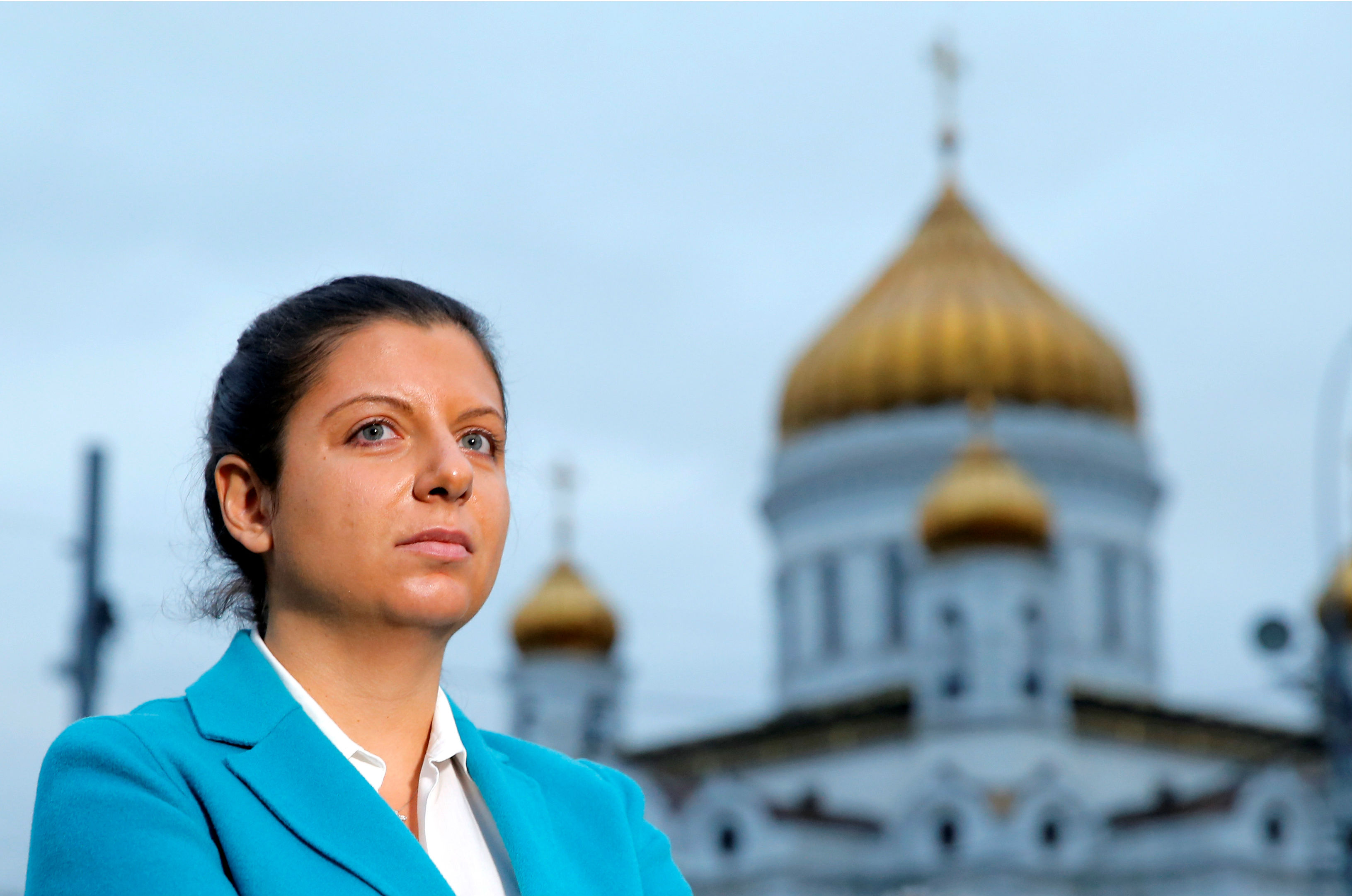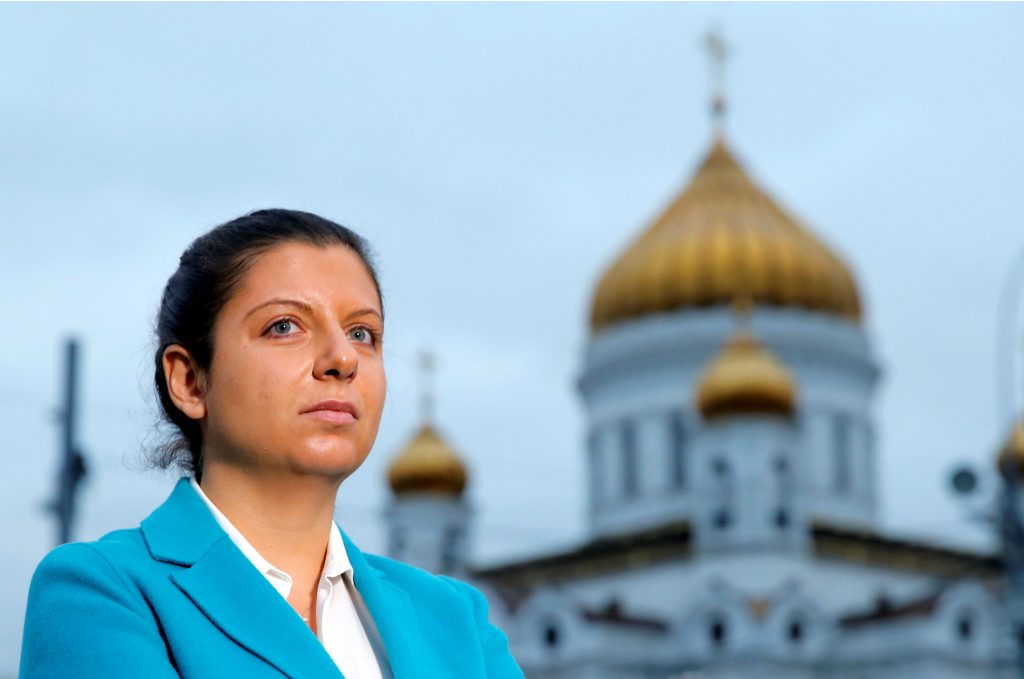 RT aims to discredit the United States in a straightforward way. The Kremlin-funded television network—established in 2005, operating in English, Arabic, and Spanish—doesn’t report on America and the West warts and all, but rather focuses single-mindedly on warts alone. That’s not all. Sins of omission, falsehoods, and conspiracy theories—like Ukraine shooting down the Malaysian Airlines passenger flight in 2014 to gain sympathy—help advance a narrative of US leaders hypocritical and unreliable; American allies weak and corrupt; democracy and free enterprise, a sham.
RT aims to discredit the United States in a straightforward way. The Kremlin-funded television network—established in 2005, operating in English, Arabic, and Spanish—doesn’t report on America and the West warts and all, but rather focuses single-mindedly on warts alone. That’s not all. Sins of omission, falsehoods, and conspiracy theories—like Ukraine shooting down the Malaysian Airlines passenger flight in 2014 to gain sympathy—help advance a narrative of US leaders hypocritical and unreliable; American allies weak and corrupt; democracy and free enterprise, a sham.
In a post-fact, post-truth world, Vladimir Putin’s Russia revels in exploiting western vulnerability.
In February, the Kremlin—eager to sow distrust between local populations and NATO allies—fed Lithuanians fake news that German speaking men had raped a 15-year-old Lithuanian girl from a foster care home in the town of Jonava, close to German army barracks (German soldiers being part of a ramped up NATO deployment). In the run up to the first round of French presidential elections in April, sources reportedly linked to Moscow sought to undermine pro-EU, pro-NATO candidate Emmanuel Macron by spreading rumors of a gay extramarital affair. This, while Macron’s rival Marine Le Pen was feted by Putin in Moscow. The recent decision of the Macron campaign to bar RT and Sputnik, another Russian propaganda outlet, from its headquarters—alongside accusations of Russian cyberattacks—was met with denials and outcries.
RT’s editor-in-chief Margarita Simonyan lamented, “So this is how gracelessly freedom of speech ends in a country which prides itself on its freedoms almost more than it prides itself on its Camembert and Brie cheeses.”
It’s time to push back—with full force. And to get this right, the context must be clear.
First, we must recognize that Putin’s only real strength is our weakness. The West’s structural problems—from declining social mobility and extreme income inequality in the United States to issues of employment, migration, and identity across Europe—create immense possibilities for a Russian regime bent on doing us harm. Democracy has shown itself capable of self-correction and renewal. We’ll get through our current malaise. In the meantime, we mustn’t waiver in defense of liberal democracy. It’s a central fact: the opportunity seekers, the homeless, and displaced still want to come to America and the West. No one dreams of living in Putin’s mafia state. Let’s never fail to remind that the democratic West, with all its ailments, remains by miles morally and economically superior to the dark and corrupt ways of Putinism.
Second, let’s be clear; this is war and Putin is determined to win. At first it seemed his regime might be content with a continent divided into spheres of influence. Over time, though, Putin’s gaze shifted to a bigger prize: an EU rendered weak and dependent, a NATO emasculated, the transatlantic link perhaps even severed. Putin is fond of America First nationalism because he believes it will make Russia great again, by pushing America to the side. He has his vision. We must reestablish ours. We need a well-resourced, strategically-minded foreign policy aimed at putting Putin back on his heels.
Only when this is in place will our own information warfare have a chance to succeed.
Finally, we must respond to the growing range of Russian efforts to divide and conquer. But playing defense alone creates a whack a mole problem. Putin’s cyber armies and proxies spew out as much as conceivably possible to see what sticks. The allegation that British intelligence conspired with the Obama administration to spy on Donald Trump during last year’s election campaign—reported by Fox News this spring and tweeted by the US president—turned out, for example, to be fake news made in Moscow.
We urgently need a robust offensive. This doesn’t mean emulating Kremlin techniques of disinformation. Nor can any of this become the business of slick “messaging” and clever “counter-narratives.” If the West is to rebound, we must never stray from facts. Therefore, let’s flood Russia with accurate, reliable information and serious investigative reporting on Putin’s kleptocracy, a self-dealing system that loots a magnificent Russian civilization—financially, intellectually, spiritually, and culturally. Let’s build coalitions that include Russian liberals and nationalists. Let’s isolate and hasten the demise of a criminal enterprise responsible for misery inside Russia and abroad.
American public diplomacy must do its part. US media led by Radio Liberty and Voice of America can contribute significantly. But here’s the first rub: Americans and Europeans allow the likes of RT into our markets—we actually do cherish freedom of speech. It’s time we demand full reciprocity, as our media remain subject to draconian regulations and restrictions in Russia.
We must be allowed access to television licenses. Intimidating and harassment of affiliates—through politically motivated use of tax auditors and anticorruption police, for example—must end. It’s dangerous to report inside Russia in any case. Killings, poisonings, and mysterious deaths come with the territory.
Let RT editor Simonyan, in the name of free speech, persuade her bosses in the Kremlin to take a first small step: open the Russian market and level the playing field. Allow us the same rights as we afford RT.
If Moscow refuses, boot from the US Kremlin pawns masquerading as journalists. This is the new kind of war. It’s time we fight to win.
Jeffrey Gedmin is a senior fellow at the Atlantic Council and Georgetown University’s School of Foreign Service, and is a senior adviser at Blue Star Strategies. He is the former president of Radio Free Europe/Radio Liberty.
Image: Margarita Simonyan, editor-in-chief of Russian broadcaster RT, meets with journalists, with the Cathedral of Christ the Saviour seen in the background, in Moscow, Russia, October 17, 2016. REUTERS/Maxim Shemetov
